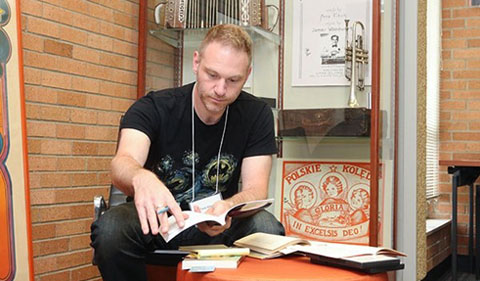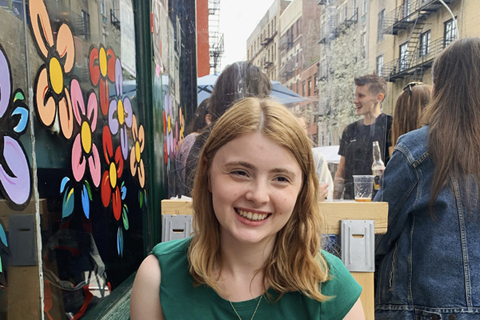Tony Vinci’s students will soon get to explore life in an apocalyptic Africa, in a North American technological utopia, in a world without animals, in a Japanese-American vision of romance and intimacy after civilization collapses, and much much more.
Creating this course is Vinci’s intellectual reward for earning one of OHIO’s University Professor awards for 2022-23.
The course, “Apocalyptic American Fiction: Trauma, Intimacy, and Ethics After the End of the World,” will explore how narratives about the end of the world might help people grapple with three fundamental but elusive features of contemporary American life: trauma, intimacy and ethics.
“The world is always ending, isn’t it? As individuals and communities, we are always in a state of losing … versions of ourselves, people we love, memories we cannot quite hold on to. All transformations are in some way apocalyptic; all change requires an end to a certain way of thinking or living. But those are just the internal apocalypses, personal losses that alter us,” said Vinci, associate professor of English who teaches at OHIO Chillicothe.
“Let’s think of real, historical apocalypses: animal extinction, Indigenous American genocide, the trans-Atlantic slave trade—such events mark the end to certain worlds, certain versions of the world. Just look at some of the place names in Southern Ohio: Chillicothe, Shawnee, Ashtabula. These names are ghosts, pointing to people and worlds that no longer exist. For millions, what we call the world has already ended. And none of this considers the present or future apocalypses we might experience—ecological catastrophe, impending war, rampant social injustice. It’s no wonder apocalyptic fiction entrances American writers and audiences.”
Vinci has some experience with ghosts, at least of the literary genre.
In 2020 he published his second book, Ghost, Android, Animal: Trauma and Literature Beyond the Human (Routledge 2020). In the book, he establishes how post-WWII American novels engage the unstable realities of victimization, violence, and loss by experimenting with critical posthumanism, an interdisciplinary field of study that challenges the notion that the human is the central agent on planet Earth.
‘Beyond our Little Realities’
While he specializes in contemporary American literature and film, Vinci says much of his teaching lives at the crossroads of popular culture and American literary history. His classes bring HBO’s Game of Thrones into conversation with Holocaust literature, juxtapose young adult fantasy literature with literary modernisms, and understand androids in film through African American literary theory.
The timing of the apocalypse course while war rages in Ukraine is somewhat happenstance, but Vinci says the topic has been bubbling in his consciousness for some time.
“We’ve always had apocalyptic literature, and for as long as we’ve had film, we’ve had apocalyptic movies. But something special has happened in the last few decades that amplifies the volume and intensity of this work that I want to study with my students. There’s something … soft about many of our apocalyptic texts, something intimate and sublime that shivers beneath the surface of these stories. The tales we’re going to study invite us to rethink who we are, how we live, and what the word ‘world’ might actually mean beyond our little realities,” he said. “I’m so excited to see how students think with these strange and diverse stories.”
Throughout the class, Vinci will ask students to consider: How might apocalyptic stories narrate hopes and anxieties about social (in)justice, violence, environmental calamity, and other large-scale concerns that often instigate trauma, create cause for intimacy, and challenge our ethics? How might they deepen our awareness of individual and collective experiences with intimacy, grief, and trauma? How might tales that liberate characters from the normalcies of American life encourage us to discover new forms of intimacy while learning to live more ethically?
“If we do our jobs well and read these texts with care, perhaps we will learn what many characters in apocalyptic American fiction learn: We are connected by precarity, and it is through our vulnerabilities that we may foster innovative visions of kinship and community with the endless array of lives, both human and nonhuman, with which we share the planet,” he notes in the syllabus.
Vinci’s 3-credit course, Apocalyptic American Fiction: Trauma, Intimacy, & Ethics After the End of the World, will be cross-listed as UP 4901U and ENG 4900 and will be taught on Tuesday and Thursday from 11 a.m. to 12:20 p.m. It will be taught in-person on the Athens campus for the fall 2022 semester.
‘Liberal Arts and Humanities … an Act of Risk’
Vinci’s powerful and persuasive teaching has been recognized before. He was awarded an OHIO Presidential Teacher Award in 2019. But his real reward might be the energy that happens in his classroom.
“At the core of my teaching burns the belief that students ought to demonstrate a way of thinking—a way of being—by participating in intellectual and creative procedures that inspire a deep and abiding curiosity. Beyond learning the known and accepted, their curiosity should lead them to develop something novel, something innovative, something of lasting import—both to themselves and to their communities. Why are they here? What are the current limits of their values, skills, and perceptions? How might they transcend them? What do they dare themselves to learn? Such questions seek to empower students to steer their educations in directions both pragmatic and transformative,” he said.
“I compel students to view the study of the liberal arts and humanities to be an act of risk, impelling them to engage the unruly interactions between culture and artistic production, language and experience, and individual thought and social action. I turn my students and their academic productions into the ‘real’ texts of each course I teach. By positioning students—their questions, their ideas, their curiosities—at the very center of a course, they learn to be responsible for transforming their communities through the rigorous practices of researching and writing. Within such an environment, knowledge is not solely taught by a professor but created by a community of learners from diverse backgrounds and with varying levels of academic preparedness. I find that this approach prepares students to interact deeply with course material while challenging their own assumptions and preparing them to advance their own independent research,” Vinci said.



















Comments